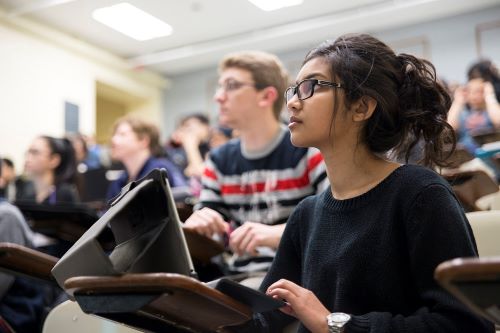
Solve real-world challenges from partner organizations
The Sandbox is an innovative program that partners external organizations with multiple A&S courses, offering you the opportunity to participate in experiential learning while in the classroom setting.
As part of a Sandbox course, you will be tasked with creating multifaceted solutions to real-world challenges, while fostering multidisciplinary skills and connections. Students from several courses address the same problem, providing a unique opportunity for students from different subject areas to propose solutions from their distinct perspective. When the project ends, students have a chance to present their insights and solutions to the external organization.
Courses with a Sandbox component earn 0.5 or 1.0 credit and count towards degree and program requirements.
There is no additional cost to participate in a Sandbox course.
Benefits of Sandbox
By enrolling in courses with a Sandbox component, you can:
- Collaborate with students in other disciplines
- Develop relationships with external organizations
- Work on real-world projects to add to your resume or portfolio
Who is Eligible to Participate?
Sandbox courses are open to students in any year. To be eligible, you should be:
- A full-time undergraduate degree student in the Faculty of Arts & Science — St. George campus
- In good academic standing
- Enrolled in a course offering a Sandbox component (see course list below)
Sandbox Courses
You can enrol in the Sandbox courses during regular course enrolment periods.
| Course Code & Name | Offered In |
|---|---|
|
CSC301H: Introduction to Software Engineering |
Fall/Winter 2024-2025 |
|
CSC494Y: Computer Science Project |
Fall/Winter 2024-2025 |
|
EDS355H: Social Justice in Education |
Winter 2025 |
|
ENT200H: Introduction to Entrepreneurship |
Fall 2024 |
|
GGR472H: Developing Web Maps |
Winter 2025 |
|
HMB201H: Introduction to Fundamental Genetics and its Applications |
Winter 2025 |
|
HMB301H: Biotechnology |
Fall 2024 |
|
HMB490Y: Health in Community |
Fall/Winter 2024-2025 |
|
HST306H: Health, Nutrition and Food Security |
Winter 2025 |
|
INS460H: Indigenous Theory, Research and Methods |
Winter 2025 |
|
NFS400H: Functional Foods and Nutraceuticals in Human Nutrition |
Winter 2025 |
|
NFS486H: Obesity: Metabolic and Clinical Aspects |
Winter 2025 |
|
PCJ362H: Experiential Learning in PCJ (peace, conflict, justice) |
Winter 2025 |
|
PHL277H: Ethics and Data |
Winter 2025 |
|
PSY332H: Organizational Behaviour |
Winter 2025 |
|
TRN303H: Ethics and Society |
Fall 2024 |
|
SOC327H: Sociology of Sports |
Winter 2025 |
|
SOC494H: New Topics in Sociology |
Winter 2025 |
|
STA130H: An Introduction to Statistical Reasoning and Data Science |
Fall 2024 |
Case Studies from Fall/Winter 2023-24
In Fall/Winter 2023-24, the Faculty of Arts & Science piloted The Sandbox in a handful of participating courses, as part of the Global Sandbox Alliance. Here are two examples of the challenges students had the opportunity to work on together:

The Toronto District School Board’s Active Transportation unit needed to raise awareness of the benefits of walking and biking to school as a healthier and more eco-friendly alternative to vehicles and school buses.
- Analytical environmental chemistry students collected air quality and road dust samples from school sites.
- Geography web mapping students created live, GIS web maps of school neighbourhood walking routes.
- Writing and rhetoric students used these outputs to create infographics and social media reels highlighting the benefits of active travel.
"I learned how to apply GIS analysis tools to help benefit society and the environment, which is something I want to do in my career."
— Geography student

The Problem:
UNICEF developed a machine-learning model to predict conflict escalation across the globe. They enlisted The Sandbox at U of T to refine the model’s accuracy while also exploring its ethical and geopolitical impacts.
The Sandbox Solution:
To tackle this multi-faceted problem, The Sandbox enlisted the collective output of students in statistics and computer sciences courses for data and technology solutions, while students in political science and ethics courses examined societal and humanistic perspectives.
Sandbox in the News

Over a thousand students from 11 different courses came together to solve problems faced by the Toronto District School Board, UNICEF and Access Alliance. Using their multidisciplinary skills, they created a model for refugee resiliency, used machine learning to predict conflict escalation around the world, worked with one of UNICEF’s data management platforms and helped the TDSB analyze environmental data and develop a plan to encourage students to walk and cycle to school instead of using a car or bus.
Read more about their experience: Sandbox program pairs students with organizations outside U of T in solution-seeking collaboration
Get Started
For more information or to get started, please contact Christine Ovcaric, Program Manager, The Sandbox, at christine.ovcaric@utoronto.ca.
About the Global Sandbox Alliance
The University of Toronto is a member of the Global Sandbox Alliance, a network of institutions offering The Sandbox model. Originating in Australia at the University of New South Wales, this global network will foster productive, lasting partnerships, leveraging global expertise and resources to support the member universities’ research, education and social engagement activities.

